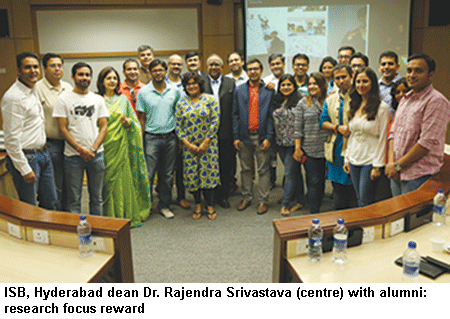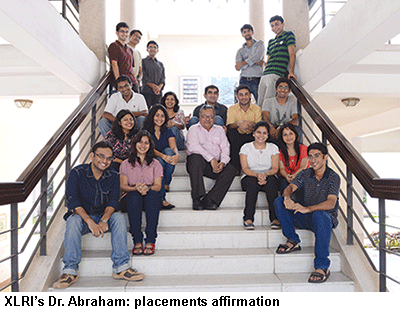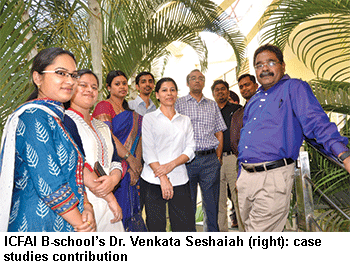India’s top 50 private B-schools 2017
Apart from the Central government’s generously funded and heavily subsidised IIMs, which offer high-quality business management education to a mere 1.4 percent of the 232,000 students who write CAT annually, there are a few dozen private B-schools which offer quality education to MBA aspirants looking for other options – Summiya Yasmeen writes about India’s top 50 private B-schools 2017
 Even though a handful of India’s top-ranked business management institutes such as the Central government-promoted Indian Institutes of Management (IIMs) sited in Ahmedabad, Bangalore and Calcutta, and latterly the privately promoted Indian School of Business, Hyderabad, are globally renowned and ranked among the global Top 100 by the highly respected Financial Times, London, the majority of the country’s 3,450 B-schools are annually certifying an estimated 332,000 MBAs who are totally unprepared for employment in India Inc.
Even though a handful of India’s top-ranked business management institutes such as the Central government-promoted Indian Institutes of Management (IIMs) sited in Ahmedabad, Bangalore and Calcutta, and latterly the privately promoted Indian School of Business, Hyderabad, are globally renowned and ranked among the global Top 100 by the highly respected Financial Times, London, the majority of the country’s 3,450 B-schools are annually certifying an estimated 332,000 MBAs who are totally unprepared for employment in India Inc.
According to a 2016 survey conducted by Assocham (Associated Chambers of Commerce of India), only 7 percent of MBAs certified by Indian B-schools are employable in Indian and foreign multinationals. The survey reveals that over the past five years, the number of seats in B-schools countrywide doubled from 360,000 in 2011-12 to 520,000 in 2015-16. Predicting an “unfolding B-school disaster”, the Assocham survey highlights “lack of quality control and infrastructure, low-paying jobs through campus placement and poor faculty” as the causes of under-qualified MBAs entering Indian industry.
Unfortunately, few people are aware of the high socio-economic price paid by society and the citizenry for poor quality business management education dispensed to all graduates except the brightest and best 1.4 percent who top the annual CAT (common admission test) of the country’s 20 IIMs and/or the ISB entrance exam. Employee productivity in Indian industry, agriculture, government and the services sector is among the lowest worldwide, and ICOR (incremental capital output ratio), i.e, units of capital required to produce a unit of output, is among the highest (4:1) worldwide.
The consensus of informed opinion is that the blame for the mushroom growth of B-schools of indifferent quality should be laid at the door of the Delhi-based All India Council for Technical Education (AICTE, estb. 1987), the apex licensing and supervisory body for engineering, business management, pharmacy, architecture, and hotel management education. For the past 30 years, AICTE chairmen and bureaucrats have indiscriminately licensed private sector B-schools without proper study of the antecedents and education delivery capabilities of their promoters. The outcome is that most B-schools are under-invested in terms of infrastructure, number and qualifications of faculty. They dispense obsolete, industry-agnostic education through faculty of dubious qualifications after seducing students through attractive advertisements, featuring tall and usually unverifiable claims of six-figure campus placements.
However, while this general indictment of the great majority of the country’s B-schools is justifiable, there are exceptions to the rule. Apart from the generously-funded and heavily-subsidised IIMs which routinely top all media rankings surveys and offer high-quality management education to a mere 3,300 of the 232,000 students who top CAT, there are a few dozen privately promoted B-schools which offer acceptable quality postgraduate business management education to the 98 percent who don’t top CAT and are obliged to look for other options. Therefore to enable parents and students to choose the most suitable of the country’s private B-schools, in 2016 EducationWorld introduced its league tables rating and ranking India’s Top 50 private B-schools.
This year as well, your editors commissioned the Delhi-based Centre for Forecasting and Research Pvt. Ltd (C fore) to constitute a knowledgeable sample database comprising 613 faculty members and 511 final year students enrolled in B-schools countrywide and 122 industry representatives. These sample respondents were asked to assess the country’s most reputed private B-schools on 11 parameters of business education excellence viz, leadership, competence of faculty, faculty welfare & development, research orientation, curriculum and pedagogy, industry interface, placement, infrastructure and facilities, value for money, life skills and internationalism.
“The scores awarded by respondents under each parameter were multiplied by ten and totalled. Ratings awarded by faculty/students to their own institutes were invalidated and B-schools not known to at least 25 respondents were eliminated. Moreover, unlike the 2016-17 survey in which we only ranked B-schools offering two-year MBA programmes, this year we have included reputed B-schools offering 12-month MBA diploma programmes,” says Premchand Palety, promoter chief executive of C fore.
 Inclusion of institutes offering the 12-month MBA programme has catapulted the highly-fancied Indian School of Business (ISB), Hyderabad, to the very top of the EW Top 50 private B-Schools league table this year. The 2016-17 topper XLRI, Jamshedpur has been pipped at the post by ISB. This rearrangement of seating at top table has pushed SPJIMR (S.P. Jain Institute of Management and Research), Mumbai to #3 (2 in 2016) and the Narsee Monjee Institute of Management Studies (NMIMS), Mumbai to #4 (3), IMT, Ghaziabad to #5 (4) and Symbiosis Institute of Business Management, Pune to #6 (5).
Inclusion of institutes offering the 12-month MBA programme has catapulted the highly-fancied Indian School of Business (ISB), Hyderabad, to the very top of the EW Top 50 private B-Schools league table this year. The 2016-17 topper XLRI, Jamshedpur has been pipped at the post by ISB. This rearrangement of seating at top table has pushed SPJIMR (S.P. Jain Institute of Management and Research), Mumbai to #3 (2 in 2016) and the Narsee Monjee Institute of Management Studies (NMIMS), Mumbai to #4 (3), IMT, Ghaziabad to #5 (4) and Symbiosis Institute of Business Management, Pune to #6 (5).
ISB was promoted in 2001 by the captains of India Inc in collaboration with the globally top-ranked Wharton and Kellogg schools of business, at a massive project expenditure of Rs.250 crore, on a spectacular 250-acre campus in the suburb of Gachibowli. Despite its sky-high (by Indian standards) tuition fee of Rs.30 lakh and compressed 13-month diploma programme — the highly respected Financial Times, London ranks ISB #29 in its Global MBA Ranking 2016 (cf. IIM-Ahmedabad #22 and IIM-Bangalore #62) — in 2016, this Hyderabad-based private B-school received (top secret — Editor) admission applications against the 560 seats it offers annually.
The 1,246 knowledgeable sample respondents of the EW India Top 50 private B-schools survey are equally impressed. ISB is ranked #1 on six parameters — faculty competence, faculty welfare and development, research, internationalism, curriculum and pedagogy, infrastructure facilities, and #1 overall.
“We are pleased that your knowledgeable respondents have recognised ISB’s sustained effort to dispense world-class education to our students. I am particularly pleased with our top ranking on the parameter of research and innovation, because our focus for the past few years has been on creating synergies between India, Asia and global business environments. ISB is also rated as the most productive research institution in India by Financial Times and is the only Indian B-school featured in the prestigious UT Dallas Top 100 research rankings. Going forward, we have set our sights on ISB being unanimously acknowledged as the top-ranked business school in Asia,” says Dr. Rajendra Srivastava, professor of marketing strategy and innovation and dean of ISB. An alumnus of IIT-Kanpur, Pittsburgh and Rhode Island universities, Srivastava acquired valuable administrative and research experience at the University of Texas at Austin, Emory University, Atlanta and the Singapore Management University before he was appointed dean in 2016 after a global search.
 Dr. E. Abraham S.J, director of XLRI, Jamshedpur (estb.1949) is unfazed about “India’s oldest B-school” conceding its last year’s top ranking by a narrow margin. He derives considerable satisfaction from XLRI’s #1 ranking on four parameters of business education excellence — placements (given the highest weightage of 250), value for money, leadership and life/soft skills.
Dr. E. Abraham S.J, director of XLRI, Jamshedpur (estb.1949) is unfazed about “India’s oldest B-school” conceding its last year’s top ranking by a narrow margin. He derives considerable satisfaction from XLRI’s #1 ranking on four parameters of business education excellence — placements (given the highest weightage of 250), value for money, leadership and life/soft skills.
“For over 60 years, XLRI has strived diligently to enhance its reputation to attract the most talented students, accomplished faculty and reputed organisations for campus recruitment, and provide life-long executive education. XLRI’s distinguishing feature is the strong emphasis we place on shaping responsible and ethical business leaders. Our excellent placements are an affirmation by industry of the high standards of management education we deliver. This year, 386 offers were made to our 359 graduate students with an average start-up remuneration of Rs.21.8 lakh per annum,” says Dr. Abraham. Currently, XLRI has an enrolment of 1,500 students instructed by 82 faculty.
The Top 10 league table of India’s most admired private B-schools is completed by International Management Institute, Delhi and T.A. Pai Management Institute, Manipal — both of whom have retained their last year’s #7 and #8 ranks. However, the Xavier Institute of Management, Bhubaneswar has slipped to #9 (6 in 2016) while K.J. Somaiya Institute of Management Studies, Mumbai has yielded one place at #10 (9).
Perhaps the highlight of the EW India Top 50 Private B-schools Rankings 2017-18 is the spectacular rise up the league table of ICFAI Business School (IBS), Hyderabad which has vaulted to #13 from #30 last year. Promoted in 1995 by the late finance guru N.J. Yasaswy (1950-2011), the number of IBS campuses has expanded to nine with an aggregate enrolment of 6,000 students countrywide, and the B-school was awarded deemed university status in 2008. The pioneer IBS, Hyderabad sprawls over 91 acres with a built-up area of 1 million sq. ft offering state-of-the-art academic and residential infrastructure.
“The 2016 EW ranking was very disappointing as IBS is the flagship school of the university. This year, we are satisfied with our #13 rank though our aspiration is to be among the Top 10 B-schools — public and private — countrywide. This is possible because over the past two decades we have built an excellent reputation for providing holistic business management education through the use of innovative pedagogy, contemporary curriculums, healthy industry interface and focused emphasis on soft and life skills development. Today, IBS is the third biggest contributor, after Harvard Business School and INSEAD, to The Case Centre, London, the world’s largest repository of management case studies. In 2015, our case studies were used at 870 business schools in 75 countries around the world,” says Dr. S. Venkata Seshaiah, an alumnus of Sri Venkateswara University, Tirupati, who has over 25 years of teaching and research experience (BITS Pilani and Kirloskar Institute of Advanced Management Studies, Harihar), and is the Director of IBS, Hyderabad, which has 2,200 students mentored by 144 faculty on its muster rolls.
Further down the 50-strong league table of India’s best private B-schools, several institutions have vastly improved their rankings in 2017. Among them: Flame School of Business, Pune to #31 (from #36 in 2016), KIIT School of Management, Bhubaneswar #32 (35); IFIM Business School, Bengaluru #33 (48), Gitam Institute of Management, Visakhapatnam #35 (43), and Jaipuria Institute of Management, Lucknow #38 (44).
Moreover, it’s pertinent to note that a number of B-schools featured in the all-India league table are top-ranked in their host states. For instance, the Gitam Institute of Management, Visakhapatnam is ranked the #1 private B-school in Andhra Pradesh (pop. 30 million). Similarly, SCMS Cochin School of Business ranked #41 nationally, is Kerala’s #1 and Heritage Business School, Kolkata ranked #47 all-India, is West Bengal’s #1 B-school.
Parameters of excellence: India’s Top 10 B-schools
To provide readers, especially aspiring business managers, a comprehensive profile of India’s most respected private B-schools, the Top 50 national league table is supplemented with Top 10 national rankings on the basis of parameters of excellence.
To compile the rankings league table of the country’s Top 50 Private B-schools, C fore field researchers interviewed 613 faculty members and 511 final year students of a mix of B-schools countrywide and 122 industry representatives, asking them to rate business management schools other than their own on 11 parameters, viz, competence of faculty, faculty welfare and development, research orientation, curriculum and pedagogy, industry interaction, placement record, infrastructure, internationalism, life/soft skills, leadership/governance quality and value for money. Equal weightage (100) was given to each parameter except the critical ‘placements’ which was weighted at 250. The ratings given by respondents under each parameter were totaled to arrive at an aggregate score according to which India’s Top 50 private B-schools are ranked.
Parameter rankings which highlight the prime strengths of highly ranked institutions are useful because they enable students to select institutions whose strengths match with their priorities.
Also read: EW India higher education rankings 2020-21: India’s top 100 private b-schools














Add comment